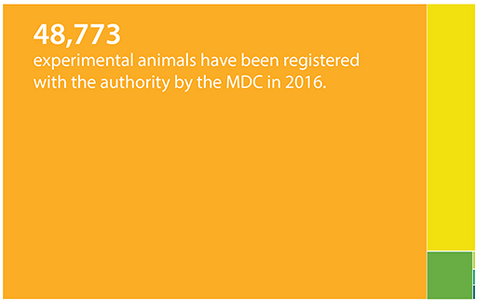Facts and Figures: MDC laboratory animal report for 2016
Mice: 43,814
Rats: 4,153
Golden hamster: 5
Other rodents: 6
Rabbits: 13
Clawed frogs: 10
Zebrafish: 772
Total: 48,773
Of the 31,993 animals that were genetically modified, 6,674 exhibited a pathological phenotype which rendered them similar to humans with specific diseases such as diabetes, coronary restriction and cancer.
Many types of experiments involve only mild suffering on the part of animals (19,572). A comparatively small number of cases (396) result in suffering that is classified as severe. Most experiments fall under the category “non-recovery” (22,788), representing animals that were anesthetized during an intervention and then allowed to die or sacrificed in a humane way without undergoing procedures.
The MDC takes animal welfare and ethical concerns surrounding animal testing with utmost seriousness. In 2012, the MDC signed the international Basel Declaration, which commits its signatories to upholding the highest ethical standards in their animal experiments. At every stage, scientists pursue the principle of the "3 Rs" (reduce, refine, replace). In each case, scientists must weigh the potential suffering of animals against the scientific benefits that can be expected before any experiment can go forward.
"These experiments are not easy on any of us," says Prof. Martin Lohse, Chairman of the Board of Directors and Scientific Director at the MDC and leader of the working group on animal testing at the German National Academy of Sciences Leopoldina. However, not every experiment can be replaced with work in cell cultures or simulations. New technologies such as CRISPR-Cas are helping scientists create animal models that more closely resemble human diseases than ever before.
"At the moment, laboratory animals remain an indispensable part of biomedical research. Yet we are highly aware of our responsibility to perform experiments in the best way possible and continue to look for alternatives," Lohse says. "In the future we will expand our research into processes of health and disease through the continued development of alternative methods such as stem cell research and three-dimensional cell cultures."
More information on science and animal research at the MDC
Contact
Vera Glaßer
Max Delbrück Center for Molecular Medicine (MDC) Berlin-Buch
Head of Communications department (interim)
Tel: +49 30 94 06 - 2120
presse@mdc-berlin.de






